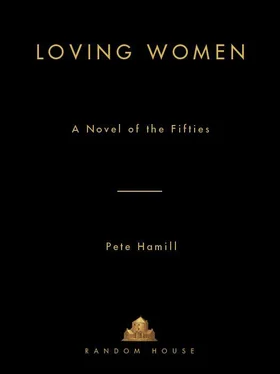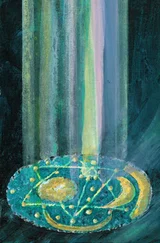
Loving women
by
Hamill, Pete
A gone shipmate, like any other man, is gone forever; and I never met one of them again. But at times the spring flood of memory sets with force up the dark River of the Nine Bends. Then on the waters of the forlorn stream drifts a ship — a shadowy ship manned by a crew of Shades. They pass and make a sign, in a shadowy hail. Haven’t we, together and upon the immortal sea, wrung out a meaning from our sinful lives? Good-bye, brothers! You were a good crowd.…
— Joseph Conrad, The Nigger of the Narcissus
Well, I’m driftin’ and driftin’ like a ship out on the sea
Well, I’m driftin’ and driftin’ like a ship out on the sea
Well, I ain’t got nobody, in this world to care for me …
— Charles Brown, “Driftin’ Blues”
Ah for another go, ah for a better chance!
— Henry James
I was stationed at Ellyson Field in 1953–54. But this is a work of fiction. The characters and events are imaginary.
Anchors aweigh, my boys, anchors aweigh.
I am on this bed in a cheap motel listening to the growl of the Gulf. My cameras remain in their silvery Halliburton case. I have hung the shirts and jeans in the closet. On the wall there is a fading photograph of the Blue Angels flying in tight formation over Pensacola. There is no room service and I am hungry, but I don’t care to move. It is a week now since my third wife left me, and I am 1,536 miles from home.
It was easy to pack my bags and drive down here, to the places I had not seen in more than thirty years. I was weary of many things: New York and the people I knew there. Photography. Myself. We were in a time of plague. All around me people were dying, as a fierce and murderous virus spread through their blood and destroyed all those immune systems that had made them so briefly human. Each day’s newspaper carried the names of the previous day’s body count. I knew some of them. Their names filled my head as I remembered them in life and tried to imagine their painful final days, but after a few hours they just became part of the blur.
In restaurants with my wife, Rose, in the final weeks, I heard other names staining the air around me: Bernie Goetz. Donna Rice. Ivan Boesky. Fawn Hall. Oliver North. A hundred others. They were chewed along with the food, their squalid tales consumed like everything else in the city that season. I would gaze around, and see the young in their West Side uniforms talking about junk bonds and arbitrage and leveraged buy-outs and treacherous partners, and I would feel suddenly old at fifty-one. I smoked too much, and most nights was growled at in restaurants by the lean young men with the health-club tans, while their women pawed self-righteously at the smoky air. The cigarettes marked me as part of another generation, my style and attitudes (though not my work) shaped by Bogart and Murrow, Camus and Malraux, those once-living icons who jammed cigarettes in their mouths as signals of their manhood, inhaled a billion of them, and died. Worse, I was twenty pounds overweight in a time when eating was paid for by hours at a Nautilus machine. I was not yet old and no longer young, and on the night of my birthday, Rose leaned over and asked me in her gray-eyed, direct way: “Michael, what is it that you want?”
I was quiet for a long while, looking out at the spring crowds parading on Columbus Avenue. I told her: “1953.”
She didn’t understand. In 1953, Rose Donofrio was not yet born. In the months when we were, as they used to say, courting, she would have smiled, and asked what I meant and tried to pry some answer from me. But that night she didn’t really care. That night, Rose had other matters on her mind. That night, Rose blinked at me and shook her head; her gaze drifted away, and when she came back, she told me that she’d met another man and wanted to go and live with him. Her eyes were suddenly liquid, as if she expected some melancholy response from me or some explosion of protest. I couldn’t give her either. That was the problem. That had been the problem for a long time. Rose gave me this fresh information, this trembling admission of betrayal, and it merely drifted like my cigarette smoke into the great blurry fog of other information, along with the contras and the calorie count of sushi. I waved at the waiter and asked for a check and Rose and I walked home in silence. By midnight, we’d agreed that she could keep the loft and I would get the country house. She packed three bags and said she would spend the night at a girlfriend’s house, a fiction to spare my feelings. We’d call the lawyers in the morning.
“You never loved me, did you?” Rose said at the door.
“Yes, I did. More than you’ll ever know.”
She closed the door, all teary now, and I looked at my watch and thought: I’d better go down soon, and buy the Times. Rose had a gift, inherited from her Italian mother, for the melodramatic gesture and the venomous aria, the cutting word and the slammed door. In a way, that was what had attracted me to her when we met, four years earlier at a party on East 71st Street. But I didn’t, or couldn’t, respond any more. There was nothing left in me of such theatrics. Maybe I was just too old. Maybe I had seen too many real bodies in too many real places for too many years. Passion had killed them all. Political passion, or religious passion, or personal passion. And I had known for years that the greatest occupational hazard I faced as a photographer was indifference. So I never plunged into her dark Sicilian storms. And I felt nothing about her abrupt and treacherous departure. It had been a long time since I’d felt anything at all.
But late on that first night alone, emptying my file cabinets and packing cartons in one of the sad ceremonies of departure, something shifted in me. I had little interest in the old tear sheets of my work, the yellowing pages of magazines (some of them dead), the folders full of birth and death certificates, licenses and diplomas. I was too old to be moved by the snapshots of people I’d once loved, and I couldn’t bear to read again the letters from vanished friends, postmarked Saigon or Lagos or Beirut. And then I came up short. Lying flat on the bottom of a file drawer was a thick, dog-eared folder. It was marked in large tight lettering, done in India ink with a Speedball pen, Personal Stuff . There were some letters inside, a group of drawings held together with a rusting paper clip, a few slips of paper bearing phone numbers, and The Blue Notebook.
I was seventeen years old when I had first started writing in The Blue Notebook — a kid in the Navy. And here it was, intact. Improbably, that sweet and serious boy I used to be had survived in its pages into the years of manhood. I set the Notebook aside. I finished packing the files and stacked the cartons along the wall beside the door. I took some pictures off the walls: a drawing by José Luis Cuevas, a painting of city rooftops by Anne Freilicher, a watercolor of Coney Island by David Levine. Over the fireplace was a nude photograph of Rose Donofrio, her hair streaming forward, her features obscured. I left it there. I filled a steamer trunk with winter clothes. I packed three more cartons with records — all those people Rose could not bear to hear: Charlie Parker and Sinatra and Dinah Washington and Wynonie Harris. A hundred others. I sealed the cartons with masking tape, then went down and bought the Times .
Читать дальше













